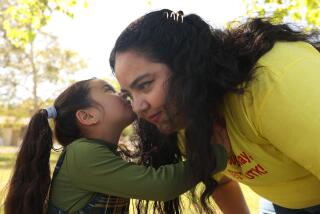S.D. Judge OKs Forced AIDS Tests on Infants
- Share via
SAN DIEGO — In an unusual example of judicial activism, a San Diego judge has issued an order allowing county authorities to compel AIDS tests for newborn babies deemed at risk for the disease.
Without a case, a court hearing or even litigants, Napoleon Jones, the presiding judge of the San Diego Juvenile Court, quietly issued the directive several months ago, calling it a “general order,” court records indicate.
So far, six babies have been confidentially tested since the order went into effect July 1, county officials said Thursday.
The order, which came to light only after last week’s disclosure by basketball star Magic Johnson that he had tested positive for the virus that causes AIDS, underscores the complex ethical, legal and medical issues at work as the law grapples with the spread of the virus.
Civil libertarians protested Thursday that judges lack authority to simply promulgate orders on issues of social concern, and that such tests may violate a mother’s privacy rights.
But court officials, county staff members and doctors praised the order, saying it is intended to save or prolong the lives of infants, parents and caretakers.
“There are due process rights involved, but there are also other realities involved. That’s what makes it such a tough call,” said James P. Steyer, an attorney and president of Children Now, a leading statewide children’s advocacy group. “The bottom line is this is one of those questions with no easy answers.”
Jones could not be reached for comment Thursday. He issued the order at the recommendation of a panel that included attorneys, medical experts and Juvenile Court Referee Bonnie Dumanis.
“I do remember that we had discussions about balancing the various interests, but it was the overriding best interests of the minor that led us to do what we did,” Dumanis said.
In a late Thursday meeting at the court with attorneys from the American Civil Liberties Union, Dumanis said she stressed that the judges are not likely to have a change of heart--but at least will listen to opposing views on what she called “really a novel kind of issue.”
“Sometimes reasonable minds will differ, and I think that’s where we’ll come out on this one,” Dumanis said. “But it’s well worth the debate--for everybody, I think.”
The order covers any hospital in San Diego County with a delivery room, the county staff said.
It applies to babies whose mothers or families are suspected by a nurse or social worker of being abusive, which triggers a 48-hour so-called “hospital hold” that enables county authorities to investigate their suspicions.
During those 48 hours, the mother may not take the child from the hospital. County authorities must decide during that time whether to petition the Juvenile Court for custody of the child, or release the infant to the parents.
During that time, a nurse of social worker may also develop concern that the mother is at risk for HIV, the virus that leads to AIDS, because the mother is--or is suspected to be--an intravenous drug user or has had multiple sex partners whose medical histories are unknown.
Under the order, hospital officials or social workers can ask the mother to consent to a test of her blood or the baby’s blood.
If the mother refuses consent or if, as is not uncommon, the mother disappears from the hospital without the baby, the order gives the county Department of Social Services the authority to mandate the test, and to receive the results.
Leesa Solit, program specialist with the Children’s Services Bureau of the county Department of Social Services, said Thursday that, because the testing is confidential, she could not disclose how many--if any--of the babies tested positive for the virus. She also declined to discuss whether any tests were taken over parental protest.
Solit said the majority of the cases where the test has been used have been those in which “the whereabouts of the mother are unknown or (she) has become deceased.” Solit would not disclose the cause of any death.
She said the order fills critical needs.
“It gives us access to information that will help us better treat the child medically, find appropriate caretakers for the child and provide the needed services to the child and the parent, both medical and social,” she said.
Dr. Stephen Spector, a professor of pediatrics and chief of infectious-disease medicine at UC San Diego Medical Center, also said the order was vital.
“As with many diseases, the earlier we make a diagnosis and are aware of a child having problems, the earlier we can make interventions that will have a positive impact on the child’s life,” he said.
The most common HIV test is basically a search for antibodies to the virus. Results indicating that a child tested positive for antibodies to the virus do not necessarily signal to doctors that a child is infected, Spector said.
That result tells doctors only that the mother is infected, and that the child has a 30% chance of becoming infected when, by about age 15 months, it has developed its own immune system and its own antibodies, Spector said.
But knowing that a child has tested positive means doctors stand ready to keep a close eye on the infant, Spector said.
Solit said county social workers and doctors had been suggesting for a couple of years that the Juvenile Court issue an order permitting HIV tests on newborns.
It wasn’t until earlier this year that the idea caught on, she said. Jones signed the order May 7, and the county staff waited until July 1 to put it into effect.
Not until after basketball star Magic Johnson’s dramatic announcement last week of his infection did San Diego lawyers notify The Times of the order.
Civil libertarians said Thursday that they had no quarrel with the medical or emotional concerns of helping babies who might be sick. But, they said, an order issued by a judge is not the proper legal way to tackle the issue.
To begin with, testing the baby’s blood may violate the mother’s privacy rights, ACLU attorneys said. The baby’s test results give doctors intensely private information about the mother, who may have refused to give her own blood or who may not even know the test was performed, they said.
The public may have a very good reason to know about the mother’s condition, ACLU attorneys said. What’s troubling, they said, is whether the way that information was obtained--and will be used by authorities--violates the mother’s rights.
“While the test only has a 30% chance of telling you anything about the baby, it has a lot better chance of telling you a lot about the mother,” ACLU volunteer attorney Kenneth S. Klein said. “The mother may never even be told that, much less given the chance to say, ‘I don’t want you to do that.’ ”
That’s why it’s up to a court to consider things on a case-by-case basis, not issue blanket orders like a legislature, said Betty Wheeler, legal director of the San Diego chapter of the ACLU.
More to Read
Sign up for Essential California
The most important California stories and recommendations in your inbox every morning.
You may occasionally receive promotional content from the Los Angeles Times.













